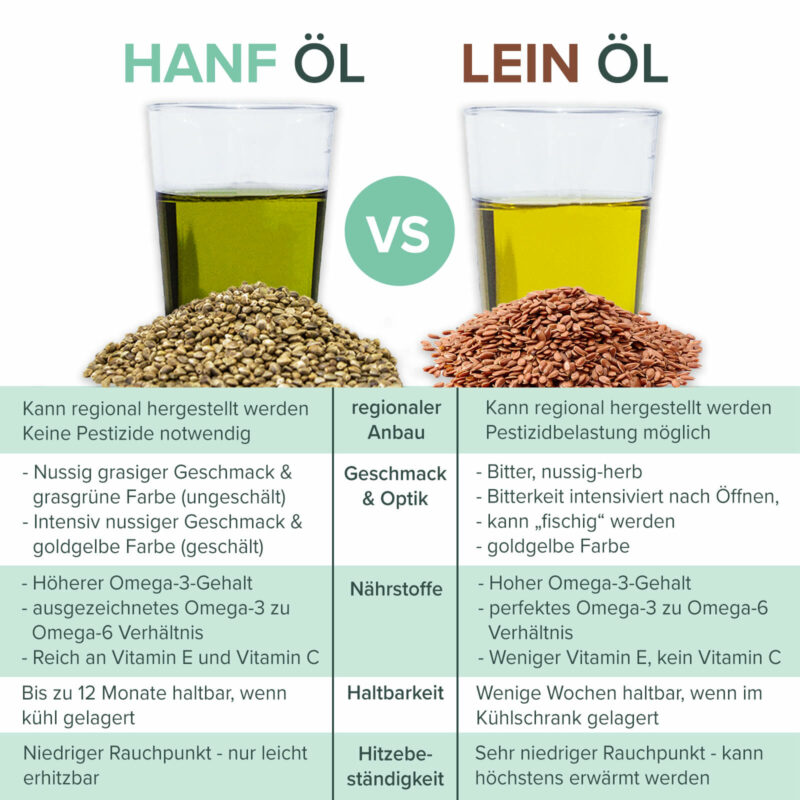You can't wait and want to know right away what the differences are? Click hereto go directly to Hemp Oil vs. Linseed Oil: The Differences!
- What does our body need healthy fats for?
- What is hemp oil?
- What is linseed oil?
- Hemp oil vs. linseed oil: differences
- Hemp oil vs. linseed oil: Conclusion
The evolution of cooking oils has picked up speed rapidly in recent years. Where our mothers or grandmothers still used rapeseed oil or sunflower oil as a matter of course, today the possibilities are almost endless.
As a pioneer of more wholesome oils, Mediterranean olive oil, which in our latitudes now has a per capita consumption of over one litre per year, paved the way for other, healthier oils. With the trend towards healthy nutrition, new vegetable oils have mushroomed in recent years. Today, there is hardly a nut, seed or even fruit like avocado oil that has not been processed into oil. In this article we compare two particularly nutrient-rich ones - hemp oil vs. linseed oil.
What does our body need healthy fats for?
Fats are not just flavour carriers, but essential nutrients that help the body stay healthy. They are important for cell membranes, which help cells absorb nutrients and oxygen and flush away waste products.
Fats are also primarily energy suppliers for our body, as they have the highest calorific value. However, they should make up less than a third of the daily energy requirement, which is why the quality of the fats consumed is crucial.
Healthy fats are characterised above all by their content of unsaturated fatty acids. Unsaturated fatty acids are divided into monounsaturated and polyunsaturated fatty acids, both of which the body cannot produce itself and is dependent on the supply through our food. Unsaturated fatty acids are mainly found in plant foods such as vegetable oil, nuts, seeds and fish such as salmon and mackerel.
Especially the intake of polyunsaturated fatty acids such as omega-3 and omega-6 fatty acids can have a positive effect on cholesterol levels and even reduce the risk of coronary heart disease. Both hemp oil and linseed oil are rich in unsaturated fatty acids and count as healthy fats.
What is hemp oil?
Hemp oil is obtained from hemp seeds of the industrial hemp. Industrial hemp has no intoxicating effect, as it has a THC content of less than 0.2 percent.
Hemp seeds are the vital superfood par excellence and contain almost all the nutrients the human body needs: high-quality protein, healthy fats, fibre, vitamins, minerals and secondary plant compounds. Hemp oil stands out especially due to its high proportion of unsaturated fatty acids and their unique composition and, together with linseed oil, is one of the table leaders in terms of omega-3 fatty acids. In addition to vitamins A, B and C, hemp oil also contains vitamin E, which is also known as a natural "anti-ageing agent". A high content of vitamin E helps to protect the cells from oxidative stress. Oxidative stress can damage the cells and promote the development of cancer.
Hemp oil is additionally good for the skin and can be used for external application for skin problems such as neurodermatitis and psoriasis.
What is linseed oil?
Linseed oil, also known as flaxseed oil, is obtained from the linseeds of the flax plant. Flax can be grown almost anywhere in the world where there is sufficient irrigation or rainfall. Often, linseed oil is confused with gold-of-pleasure oil, which, however, is obtained from a completely different plant, the gold-of-pleasure.
Linseed oil is particularly known for its high content of omega-3 fatty acids. The oil contains up to 70% of the omega-3 polyunsaturated fatty acid, placing it, with hemp oil, among the top performers miles ahead of salmon and other fatty fish. Flax seeds contain mucilage that swells, increases intestinal volume and stimulates digestion, which can help with constipation. The seeds can also have a positive effect on blood lipid levels and lower cholesterol.
Until 2010, linseed oil was banned as an edible oil in France because linseed contains prussic acid and this can lead to poisoning in too high a dosage. In fact, however, this has not been proven and the amount of prussic acid that could have negative effects is hardly achievable with 350 g to 700 g of linseed in common use.
In addition to its use as an edible oil, linseed oil is also used in the construction industry as a coating agent, for example as a wood and corrosion protection, or in the arts as a binder in the production of oil paints.
Hemp oil vs. Linseed oilDifferences
Hemp oil and linseed oil differ from each other in the following 5 points.

1. regionality & cultivation
Both linseed oil and hemp oil can be grown regionally, whereby the cultivation of linseed oil is somewhat more complex in comparison, as the hemp plant is exceptionally frugal and does not require pesticides. Linseed scores worse in this respect. In an Öko-Test study from 2022, half of the linseeds tested showed an increased mineral load.
2. taste & optics
Both oils stand out with their intense colour and flavour. Linseed oil tastes slightly bitter and nutty-tart, but intensifies this bitter taste quickly after opening and can then even taste slightly "fishy". Depending on how it is processed, hemp oil has a nutty-grassy taste with the shell or an intensely nutty taste without the shell. With the shell, the colour of hemp oil is grass-green, without the shell, similar to the colour of linseed, golden yellow.
3. unsaturated fatty acids & vitamins
Especially with regard to omega-3 fatty acids, linseed oil stands out positively. Not only does it have the highest content of omega-3 with 70%, but it also has the perfect ratio between omega-3 fatty acids and omega-6 fatty acids. The difference to hemp oil is not immense, however, as hemp oil also has a very high content of omega-3 fatty acids and an excellent ratio of omega-3 to omega-6. For comparison, this is 3:1 for linseed oil, 1:3 for hemp oil and 1:120 for sunflower oil. Especially for vegans and vegetarians, both oils are excellent vegetable sources of omega-3. In terms of vitamins, especially vitamin E, hemp oil has the upper hand. Linseed oil contains less vitamin E than hemp oil and no vitamin C.
4. durability
Linseed oil must be stored in the refrigerator and consumed within a few weeks, as it quickly becomes rancid and can even form harmful substances. Hemp oil should also be stored in a cool place, a cellar or cool room will do, and will keep for up to 12 months.
5. heat resistance
Similar to olive oil, hemp oil can be heated a little, but should not be used for frying or deep-frying. The smoke point of linseed oil is very low, which is why it can at most be heated slightly, otherwise it can form harmful trans fatty acids.
Hemp oil vs. Linseed oil: Conclusion
Hemp oil and linseed oil are very similar in their composition and thus both very healthy. They are excellent suppliers of omega-3 and omega-6 in ideal proportions and provide many valuable vitamins and secondary plant substances.
Hemp oil is much more robust and therefore has a longer shelf life than linseed oil, which has to be stored in a cool place and can quickly go rancid. Hemp oil also scores points when it comes to cooking, as unlike linseed oil it can be easily heated.
Both hemp oil and linseed oil have a strong, memorable taste and can enhance a meal, not only in terms of their nutrients.Above all, it is important, whether buying linseed oil or hemp oil, to look for high quality. Cold-pressed oils in organic quality and from regional production are recommended. The cold pressing of the oil and the processing of the shell preserve many vital substances in the oil.
Fancy organic hemp oil?
At Hempions we have two different organic hemp oils in our range. Hemp oil Classic, pressed from unhulled hemp seeds and Hemp Oil Premium from peeled, gently roasted hemp seeds. Both oils are cold-pressed and can be used to refine dishes in a similar way to olive oil. The Classic hemp oil has a subtle nutty taste with slightly grassy and tart notes. The hemp oil Premium has an intensely nutty taste and additionally fine roasted aromas.
If you're wondering what you can prepare with hemp oil, then we've got just the thing for you - our hemp recipe book with over 50 hemp recipes! Sign up below and we'll send it to you as a free e-book.
Sources
www.eatsmarter.de
www.zentrum-der-gesundheit.de
www.gesundheit.gv.at
www.alternativ-gesund-leben.de
www.meine-gesundheit.de
www.krauterie.de
www.oekotest.de

